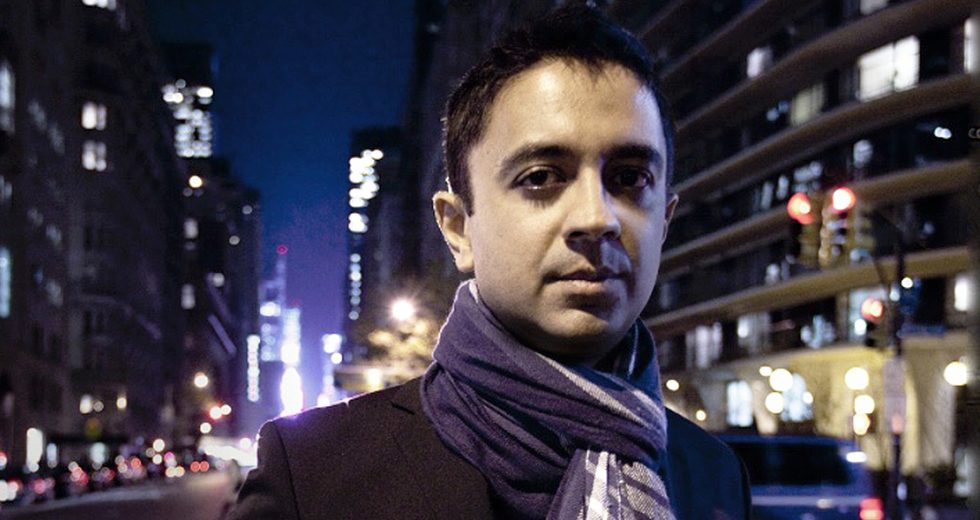
When Vijay Iyer sits down at the piano, he obviously is thinking about more than the notes on the keyboard. He imagines songs without words to pay tribute to artists he admires not just for their art, but for their stories that he tells with deep respect.
“Certainly, when I’m playing the music of Thelonious Monk or Duke Ellington, it’s often a celebration of that person’s life, that person’s humanity, a mediation on how they lived and what their struggles were,” he explained in a phone interview from his home in New York. It was the day after his 46th birthday, Oct. 26, when he had to work, albeit onstage at Carnegie Hall with the Orpheus Chamber Orchestra. “A nice way to celebrate,” he noted drily, “just standing up there, taking a bow.”
For the Chicago Symphony Orchestra’s MusicNOW series, Iyer will take his bows with a string quartet and trumpet legend Wadada Leo Smith on Nov. 13 at the Harris Theater. This concert marks Iyer’s first appearance on the CSO’s contemporary music series. His recent achievements — 2016, 2015 and 2012 DownBeat Artist of the Year awards, interspersed in 2013 with a MacArthur Fellowship — add to the anticipation factor of what promises to be an extraordinary event.
“The people I just mentioned [Monk, Ellington] were African American and experienced a proximity to true oppression. So when I deal with that repertoire, I try to honor it,” Iyer said. “And from my position as a composer and musician who has taken up that language and that heritage, I try to situate myself in terms of those histories. I try to understand my relationship to them.”
His MusicNOW program, titled “Vijay Iyer: A Portrait,” references his approach to art through different and challenging perspectives. Time, Place, Action (2014), an eight-movement work for string quartet and piano, opens the concert. He wrote the piece after the death of Amiri Baraka, a poet known, and persecuted, for his pointed takes on jazz, blues and racism.
“He was a mentor figure to me,” Iyer said. “He was very supportive of my work, and he understood my relationship to his community and his history and embraced me for who I am. So I dedicated this piece to him,” Iyer said. “Now I’ll be doing it with members of the CSO family, and it will be nice to do it in that context.”
For A Cosmic Rhythm With Each Stroke, the second half of the program, Iyer is excited to play piano and laptop alongside Smith, whom he describes as “trumpet player, composer, living legend and one of my heroes.” He and Smith created the piece in 2016 as a tribute to Nasreen Mohamedi, “a pioneering Indian abstract artist whose style predates similar [better-known Western] artists like Agnes Martin, with a lot of finely detailed patterning.”
When the Metropolitan Museum of Art commissioned Iyer for the project, he immediately identified his ideal collaborator. “Knowing Mr. Smith as an artist and person, and knowing his imagination and his spirit, I felt the connection between his work and Nasreen Mohamedi’s work,” he said.
Iyer’s sensitivity as an artist is matched by his reflective worldview. That’s no surprise, considering he holds a Ph.D. in the cognitive science of music and is a Harvard professor. He believes that we as a world are in a “moment of crisis, but also maybe a moment if rebirth.” And he readily addresses that reality.
“It’s often asked, ‘What is the goal of music at a time like this when it feels like the planet’s fate hangs in the balance every day in a very real sense. Is music merely entertainment? A distraction?
“I often go back to what Mr. Smith himself has said to me: ‘A musician’s role is to create a perfect state of being for the observer such that, if successful, the observer becomes completely absorbed in the process, in that moment.’ I apply that idea to my work, to encourage human action and interaction, so that people are not just listening, we are opening up. To me, music is a healing process.”
Note: After the 90-minute concert, MusicNOW curators and Mead Composers-in-Residence Samuel Adams and Elizabeth Ogonek will host a reception with Vijay Iyer and Wadada Leo Smith.
Joe Pixler is a Chicago-based writer and editor.